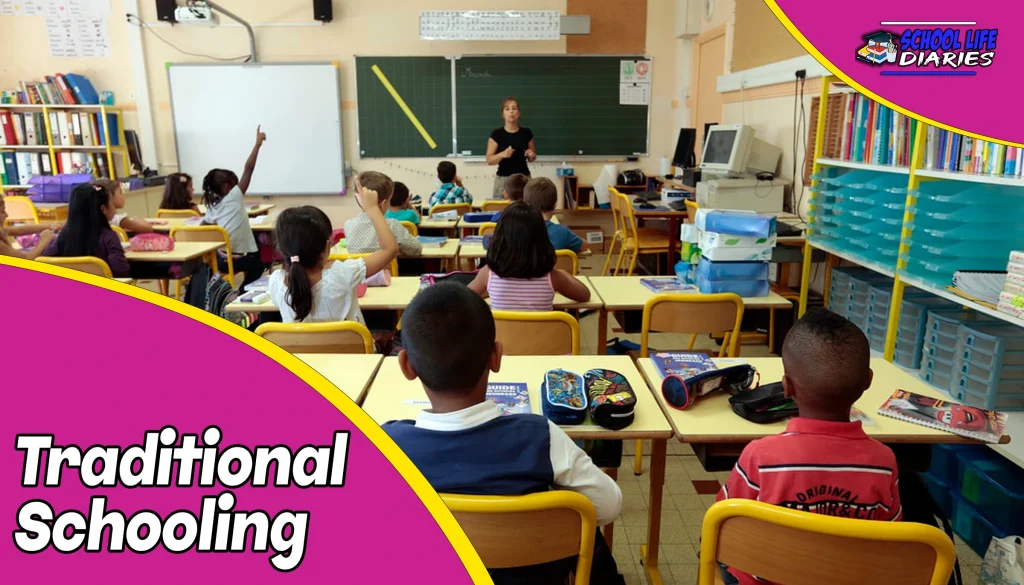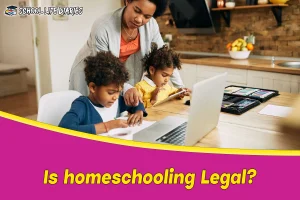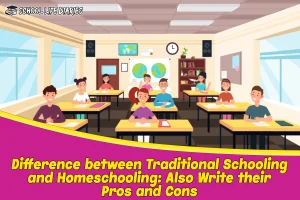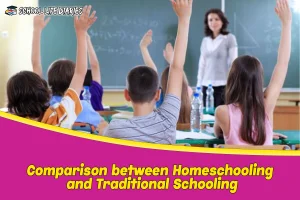Traditional schooling and homeschooling are two prominent methods of education, each with its own advantages and disadvantages. The debate surrounding which approach is better has long been a topic of discussion among educators, parents, and students.
Traditional schooling refers to the conventional method of education where students attend physical schools and are taught by certified teachers. Both traditional schooling and homeschooling have their merits. Formal schooling provides socialization opportunities for students, allowing them to interact with peers from diverse backgrounds and develop essential social skills.
What is Traditional Schooling?
Traditional schooling refers to the conventional system of education where students attend physical classrooms taught by professional teachers following a structured curriculum. In this setting, students learn in a group environment and are exposed to various subjects and disciplines. The main advantage of traditional schooling is the opportunity for social interaction and collaboration with peers.
Another advantage of traditional schooling is the presence of trained teachers who specialize in specific subjects. These educators have expertise in their respective fields and can provide students with comprehensive knowledge and guidance. They can address questions, clarify concepts, and offer personalized support to ensure that each student understands the material being taught. Additionally, professional teachers can also serve as role models for students, inspiring them to pursue academic excellence and personal growth.
Schools often have well-equipped libraries, laboratories, sports facilities, and extracurricular activities that contribute to a holistic educational experience. These resources allow students to explore different areas of interest beyond the standard curriculum while fostering creativity and critical thinking skills. It is important for parents to carefully consider these factors when deciding on the best form of education for their children’s overall development.
What is Homeschooling?
One alternative to the traditional school system is the practice of parents educating their children at home, known as homeschooling. Homeschooling involves parents taking on the role of a teacher and providing education within the confines of their home. This method allows for a more personalized approach to learning, tailored to the individual needs and interests of each child. It also provides flexibility in terms of scheduling and curriculum choices.
Parents who choose homeschooling often cite several advantages. Firstly, they have the opportunity to create a customized learning environment that suits their child’s specific needs. One major concern is limited socialization opportunities for homeschooled children. In a traditional school setting, students have regular interactions with peers from diverse backgrounds, fostering social skills and building friendships.
Homeschooled children may miss out on these experiences unless efforts are made by parents to provide them with social outlets outside of home education. Homeschooling offers an alternative approach to education where parents take on the role of educators within their own homes. While it provides numerous benefits such as personalization and flexibility, it also presents challenges such as limited socialization opportunities.
Is homeschooling Legal?
Homeschooling legality varies from country to country, with some nations imposing strict regulations while others have more lenient policies. In the United States, for example, homeschooling is legal in all 50 states, but the specific requirements and rules can vary significantly. These criteria often include having a well-structured curriculum that covers core subjects such as math, science, language arts, and social studies.
The legality of homeschooling varies from country to country and even within different regions of a single country. While some nations have more lenient policies regarding homeschooling, others impose stricter regulations in order to ensure educational standards are met. The debate over homeschooling legality continues with arguments centered around parental rights versus ensuring a quality education for homeschooled children.
Difference between Traditional Schooling and Homeschooling: Also Write their Pros and Cons
There are distinct differences in the educational methods and environments between traditional schooling and homeschooling, with each approach having its own set of advantages and disadvantages that may impact a child’s learning experience. Traditional schooling involves attending a physical school where children learn alongside their peers under the guidance of trained teachers. This environment provides social interaction, exposure to diverse perspectives, and opportunities for extracurricular activities.
Parents or tutors serve as educators, adapting teaching methods to suit the child’s learning style. This one-on-one attention can foster a deeper understanding of concepts and enable faster progress. Despite these advantages, homeschooling has some drawbacks as well. The lack of social interaction with peers can hinder a child’s development of important social skills such as teamwork and conflict resolution.
Traditional schooling and homeschooling offer different approaches to education with their respective pros and cons. While traditional schooling provides socialization opportunities and structured learning environments, homeschooling allows for personalized instruction tailored to individual needs.
Comparison between Homeschooling and Traditional Schooling
In comparing the education methods, homeschooling and traditional schooling offer distinct approaches with their own set of benefits and limitations. Homeschooling allows for a more flexible and personalized learning experience as it is tailored to the individual student’s needs and interests. It provides freedom in terms of scheduling, curriculum choices, and teaching methods.
On the other hand, traditional schooling provides a structured environment that prepares students for the demands of the real world. It offers social interaction opportunities, allowing students to develop essential skills such as teamwork, communication, and conflict resolution. The presence of trained teachers also ensures that students receive specialized instruction from subject matter experts.
Both methods have their drawbacks. Homeschooling may lack socialization opportunities compared to traditional schooling where students interact daily with peers from diverse backgrounds. This could potentially lead to difficulties in adapting to group dynamics or developing crucial social skills early on. On the other hand, traditional schooling might limit individualized attention due to larger class sizes and standardized curricula that may not cater fully to each student’s unique strengths or weaknesses.
While homeschooling offers flexibility and customization options for education delivery according to an individual student’s needs and interests; traditional schooling provides structure along with socialization opportunities necessary for holistic development. Each approach has its merits and limitations; therefore it is essential for parents or guardians to consider various factors such as their child’s personality traits, learning style preferences, and available resources before making an informed decision regarding which method best suits their child’s educational journey.
Can homeschooled Students get into College?
In comparing homeschooling and traditional schooling, it is essential to consider the potential impact on a student’s college prospects. One common concern with homeschooling is whether students will be able to gain admission to universities or colleges. The truth is that homeschooled students can indeed get into college, and many have successfully done so in the past.
While some might argue that homeschooled students may face challenges in their college applications due to the lack of standardized transcripts or grades, there are alternative ways for these students to showcase their abilities and achievements. Homeschoolers often have more flexibility in pursuing extracurricular activities, volunteer work, internships, or part-time jobs. These experiences can demonstrate their dedication, passion, and ability to take initiative beyond the confines of a traditional classroom setting.
Admissions officers understand that homeschooling allows for personalized learning experiences tailored to individual strengths and interests. As long as homeschooled applicants provide comprehensive portfolios highlighting their academic accomplishments and personal growth throughout their education journey, they stand a fair chance at being admitted into reputable institutions.
What Challenges Do Homeschooling Families Face?
Homeschooling families encounter various obstacles and difficulties in their educational journey.
One of the main challenges they face is the lack of socialization opportunities for their children. Unlike traditional school settings, homeschooling often limits interactions with peers, leading to potential isolation and a narrower worldview. Socialization plays a crucial role in a child’s development, as it helps them learn how to communicate, cooperate, and navigate relationships. Without regular exposure to diverse groups of individuals, homeschooled students may struggle when it comes to adapting to different social situations later in life.
Another challenge faced by homeschooling families is the lack of specialized resources and expertise available compared to traditional schools. In conventional schools, teachers have access to well-defined curricula and are trained in specific subject areas. They also have support from administrators, counselors, and other professionals who contribute to a comprehensive educational experience.
On the contrary, homeschooling parents often need to take on multiple roles simultaneously – acting as educators while juggling household responsibilities. This dual task can be overwhelming for parents who may not possess extensive knowledge or training in certain subjects. Homeschooling families encounter various challenges that can hinder their educational journey compared to traditional schooling methods. The limited socialization opportunities can lead to isolation and narrow worldviews for homeschooled children who miss out on diverse interactions with peers.
Conclusion
In conclusion, traditional schooling and homeschooling each have their own advantages and disadvantages. Traditional schooling provides a structured environment with trained teachers who can offer expertise in various subjects. Students also benefit from social interactions with peers, building important social skills and relationships. However, traditional schooling may lack flexibility and individualized attention for students who require personalized instruction.
On the other hand, homeschooling offers flexibility in curriculum customization and scheduling. It allows for one-on-one instruction tailored to a student’s learning style and pace. Additionally, homeschooling can provide a nurturing environment that fosters strong family bonds. Nevertheless, homeschooling may limit social interactions with peers and access to extracurricular activities typically available in traditional schools.
It is important to note that both forms of education have their unique challenges. Traditional schooling faces issues such as overcrowded classrooms and limited time for individualized attention. Homeschooling families may encounter challenges related to finding suitable resources, managing time effectively, and ensuring a well-rounded education.It is crucial to consider factors such as academic goals, learning styles, socialization opportunities, parental involvement capacity, resource availability, and legal requirements when making this decision.











